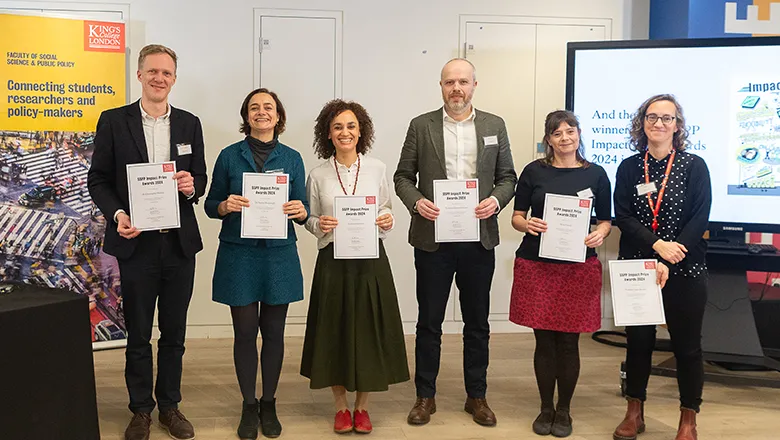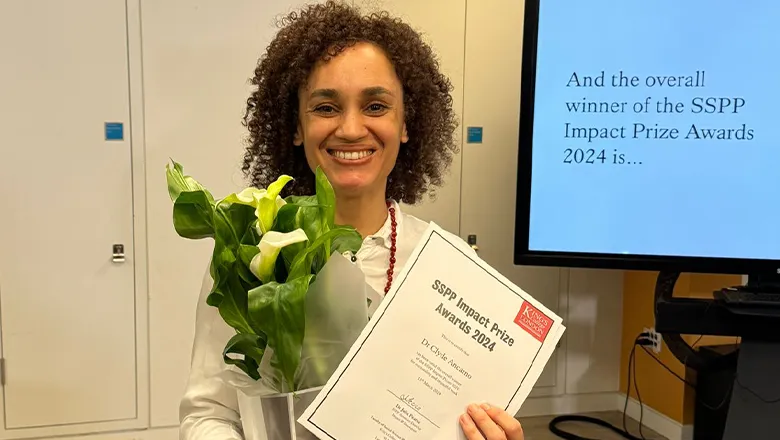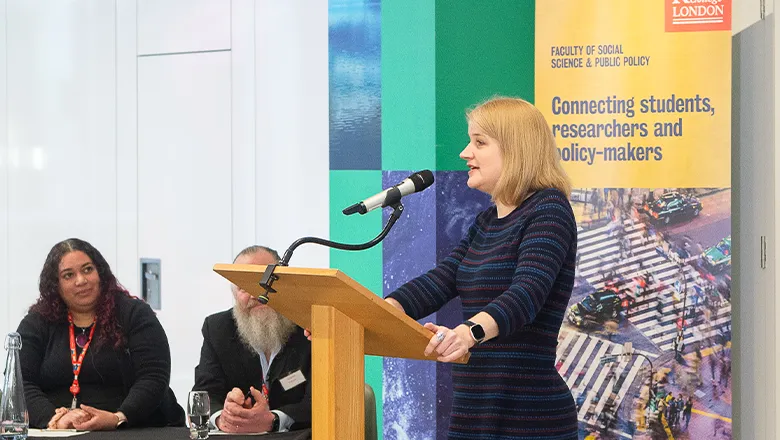I was delighted to win this award which I share with Sidia Jatta, a vocal mother tongue education advocate in The Gambia, Dr. Sabine Little of the University of Sheffield and my research assistant Lamin O Ceesay. It is also the award of the dedicated team of teachers who worked on the 'Multilingual Resources for Primary Schools in The Gambia' online toolkit. With the funding, we aim to train lecturers at Gambia College, enabling them to use the toolkit for student courses and create new resources in children’s mother tongues.”
Dr Clyde Ancarno
26 March 2024
Awards for SSPP research making the world a better place
The Faculty of Social Science & Public Policy (SSPP) held its 2024 Impact Awards to recognise and celebrate impactful research.

Researchers from across SSPP have been awarded prizes in recognition of how their work is having a positive real-world impact.
The winning research activities span creating mulitilingual resources for African schools, involving citizens in discussing and shaping economic policies, encouraging new thinking around negotiating with terrorist organisations, highlighting the unequal impacts of the COVID-19 pandemic, improving understanding of the implications of AI on security and embedding literacy in vocational education.
The six winners all received £2,000 to spend on impact activities. Dr Clyde Ancarno was also voted the overall winner by the event audience so was awarded an additional £1,000.
Dr Ancarno explained at the event, held on 13 March, that data shows that adults taught in their first language as children have better literacy skills. Yet many schools in Africa only teach in English. To help address this, she worked with local partners and developed a multilingual toolkit which includes resources for teachers. This is being rolled out shortly across primary schools in The Gambia and her work has informed government policy.

The other winners were:
- Dr Christopher Holmes, of the Department of European & International Studies, whose deliberative democracy 'Citizens Econ' project showed that ordinary people can understand and help to co-create economic policies. Others across the public sector are now seeking his advice on how best to engage the public on economic policies.
- Dr Sophie Haspeslagh, of the Department of War Studies, whose work focuses on negotiating with terrorist organisations. She introduced the term 'linguistic ceasefire' - which calls for recognising the conflict, dropping labels & uncoupling the actor from the act - which is now widely used by Government departments, Non-Governmental Organisations, the United Nations and analysts.
- Professor Laia Becares, of the Department of Global Health & Social Medicine, whose research revealed the unequal impacts of the COVID-19 pandemic on ethnic and sexual minorities. Her research led to influential reports, policy briefs, widespread media and informed evidence she was asked to contribute to the UK COVID-19 inquiry.
- Professor Kenneth Payne, of the Department of Defence Studies, researches how AI is affecting our national security. He has advised parliamentary committees & government officials, been commissioned to write reports, lectured around the world, written books and engaged with media to improve our understanding of AI.
- PhD student Rose Veitch, of the School of Education, Communication & Society, whose work looks at embedding literacy in post-16 vocational education. Using coaching, fieldwork and research she is developing new ways to support teachers to develop knowledge and embed literacy in curriculums. This award was dedicated in memory of Professor Gabriela Rundblad, a cognitive linguist, pioneering researcher, passionate teacher and outstanding mentor who passed away last year.
- PhD student Gesine Weber, of the Department of War Studies, was also congratulated as runner-up for her research looking at European defence cooperation. Through media articles, speaking engagements and an upcoming podcast, she is making European security more understandable to a wide audience.
At the event, Dr Suzanne Hall, of the Policy Institute, who was a winner at last year’s SSPP Impact Prizes outlined how she had used the award as part of her research which is looking at the cost-of-living crisis in London and what can be done about it.
The event held in The Exchange, Bush House, was hosted by Professor Jelke Boesten, SSPP’s Interim Vice Dean (Research) and Dr Julia Pearce, SSPP’s Associate Dean (Impact & Innovation).
Many congratulations to all our brilliant impact prize winners! It is such a pleasure to be able to support, share and celebrate these projects, which showcase some of the important ways that SSPP research is benefitting society.
Dr Julia Pearce, Associate Dean (Impact & Innovation)

The Impact Prize Event is one of the highlights of the academic year in terms of research. We learn about the exciting and impactful research that our colleagues in SSPP do, and how their work affects people’s lives and social worlds.
Professor Jelke Boesten, Interim Vice Dean (Research)








